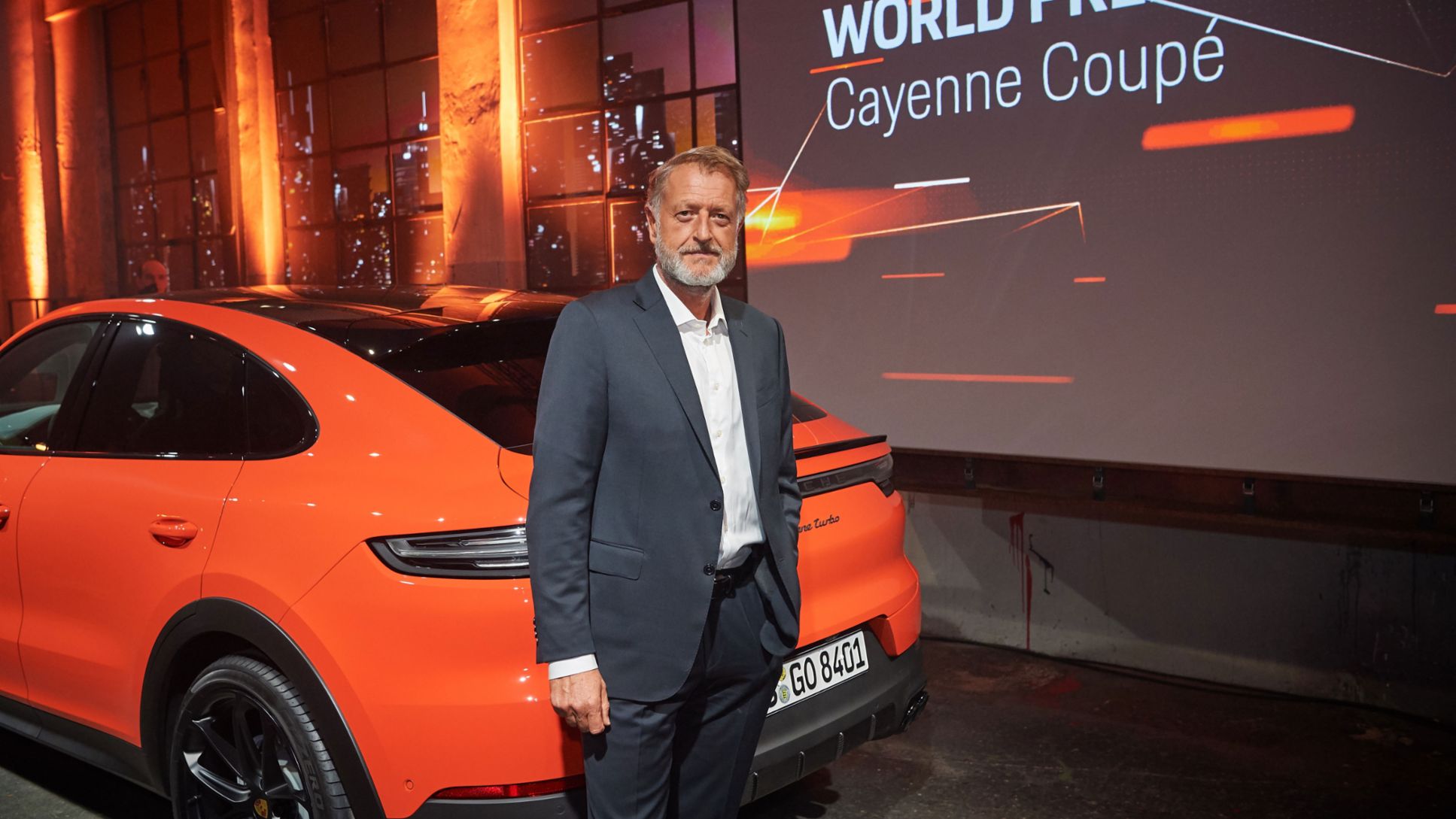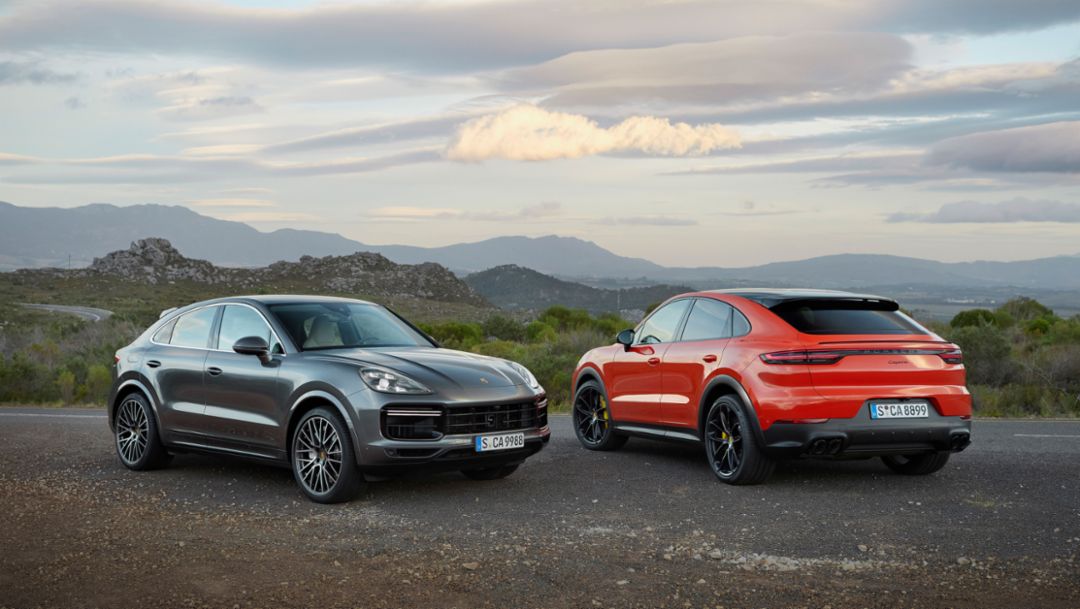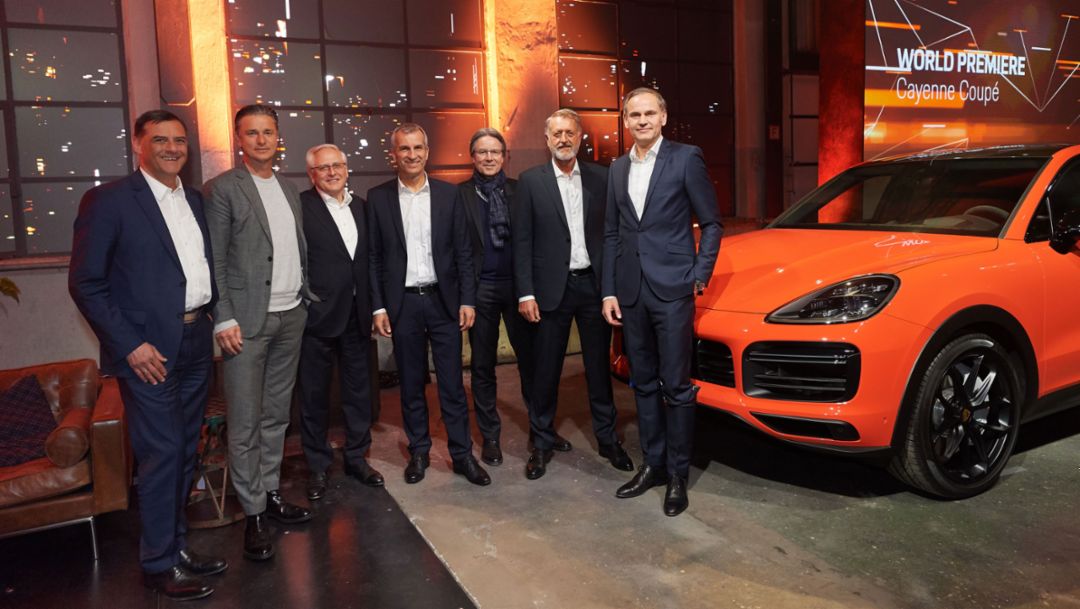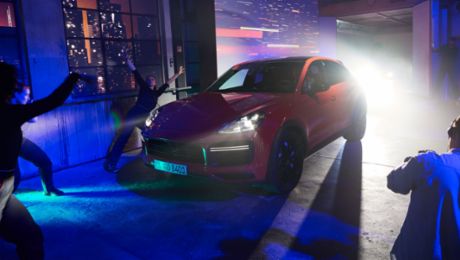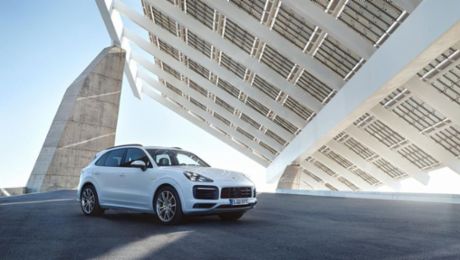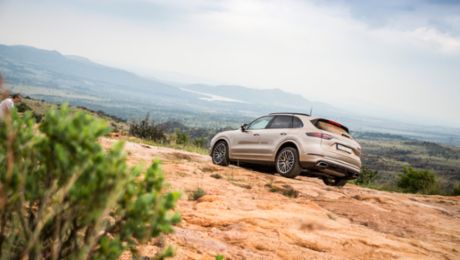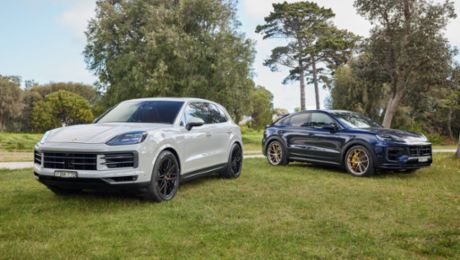Entry into a new vehicle segment: with the world premiere of the Cayenne Coupé, Porsche is extending the third generation of its successful SUV range. The vehicle impresses with its particularly dynamic contours and new technical details, which give it a very athletic appearance.
The highlights of the new Cayenne model include sharper contours with a totally unique rear end, an adaptive rear spoiler, a rear bench with the characteristics of two individual seats, and two roof concepts: a panoramic, fixed glass roof fitted as standard, and an optional carbon roof. The significantly steeper roof line falling to the rear makes this vehicle appear even more dynamic and visually positions it as the sportiest-looking model in the segment. The Cayenne Coupé will be available with two different engine variants at its market launch: a six-cylinder, turbocharged engine with 250 kW (340 PS; Combined fuel consumption 9.4 – 9.3 l/100 km; combined CO2 emissions 215 – 212 g/km), making a standard sprint from 0-100 km/h in 6.0 seconds possible as well as a four-litre V8 engine with twin turbocharging in the top-of-the-range Cayenne Turbo Coupé model, 404 kW (550 PS; Combined fuel consumption 11.4 – 11.3 l/100 km; combined CO2 emissions 261 – 258 g/km) and accelerating from a standing start to 100 km/h in 3.9 seconds.
The Cayenne – a worldwide story of success
Since the introduction of the first Cayenne in 2002, this model has been very popular with customers around the globe. More than 864,200 vehicles have been delivered to date, which amounts to 50,000 cars per year on average. With around 71,500 vehicles delivered worldwide in 2018, the model was only beaten to the top spot by the Macan. The majority of vehicles were delivered to customers in China and Europe.
Detlev von Platen, Member of the Executive Board for Sales and Marketing at Porsche AG, describes the expectations for the Cayenne Coupé in different regions, the vehicle’s customer profiles and the growing model range in an interview:
Which regions and buyer groups is the Cayenne Coupé targeting?
The Cayenne Coupé is a world conqueror. It is equally attractive to all regions. It appeals to customers who are particularly interested in the sporty genes of the Cayenne. These may be existing or new Porsche customers – with great loyalty to the brand and an expressive lifestyle. The SUV Coupé market isn’t new, but we are giving the car a character that is all its own through our typical Porsche design DNA. Of course, the sporty body shape is a particularly good match for the Porsche brand.
Seen worldwide, who are Porsche’s customers?
Our customers have a very individual and differentiated lifestyle. There is no standard Porsche customer. For this reason, it is one of our maxims to consider each customer individually. At the same time, there are properties that all our customers share. These include their striving towards performance, personal development and the extraordinary, as well as the success they have with this attitude – a certain drive to get ahead. Many also value the feeling of having found a family of like-minded people at Porsche and experiencing well-deserved pleasure. In many cases, our customers have driven models from other premium brands because they expect more from their vehicle. Anyone who then experiences the driving pleasure in an entry-level Porsche model will see that there is a much sportier way and realise that they want to evolve – to a Turbo or GT model. In this process, personal progress is much more important than external image.
How significant are surveys and market studies for model decisions at Porsche?
Customer feedback of course influences our product decisions and our customers are very committed. We receive more than 300,000 feedback reports, suggestions and requests each year. It goes without saying that we integrate all this into the development process of a new vehicle. We also repeatedly showcase our product ideas to customers and potential customers. The current Cayenne is a good example: during development we took into account a large amount of feedback on its predecessor. In particular, the interior takes into account the wishes of Porsche enthusiasts. The Taycan will be yet another example of how we integrate customer feedback into product development at an early stage. We asked our customers at the start of the development process whether they could envisage a purely electrically driven vehicle made by Porsche and what it should look like. Even now, shortly before the world premiere in autumn, we once again asked them for feedback on the final product.
The Cayenne Coupé demonstrates that the Porsche model range is becoming increasingly more versatile. Is this a trend towards diversification?
Our holistic concept does not focus on the vehicle, but rather on the brand DNA. This combination of sportiness and the demand for top quality is evident in all Porsche models and perfectly reflects our customers’ interests. All of our vehicles are sports cars, even the Panamera, Macan and Cayenne. They are the sportiest option in their respective segments – and they carry the genes of the Porsche 911. That’s why Porsche is clearly perceived as a sports car brand. And we are working hard to make sure nothing about that changes. At the same time, we are continuously expanding our product range so we can offer our customers all over the world what they want. For example, the model mix has shifted as a result of customer preferences in growth markets. Demand for sporty SUVs is very strong particularly in China, but two-door sports car sales are also on the rise.
Coupés are obviously a trend in the SUV segment. How do you create a passion in customers for Porsche as a brand?
Porsche stands for craftsmanship and meeting individual customer wishes with fascinating premium sports cars. And people are always at the heart of it all. A Porsche is always made by people: a great deal of craftsmanship, love and passion goes into every Porsche. At Porsche, we are also united by the drive to always to fight for the best solution. That is how we create individual products that inspire through outstanding quality and driving pleasure. We want to appeal more strongly to new, younger target groups with the Cayenne Coupé. These groups value exclusivity and an expressive lifestyle, and have a very performance-oriented mentality.
Consumption data
Cayenne Coupé: Fuel consumption combined 9.4 – 9.3 l/100 km; CO2 emissions combined 215 – 212 g/km
Cayenne Turbo Coupé: Fuel consumption combined 11.4 – 11.3 l/100 km; CO2 emissions combined 261 – 258 g/km
